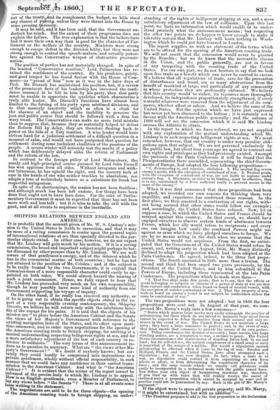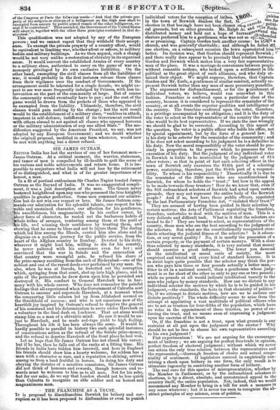SHIPPING RELATIONS BETWEEN ENGLAND AND AMERICA. IT is probable that
the account given of Mr. W. S. Lindsay's mis- sion to the United States is liable to correction' and that it may be more of a roving commission to confer upon the general topics of international relations at sea than specially directed to the par- ticular objects stated. In either case, however, we do not expect that Mr. Lindsay will gain much by his motion. If it is a roving commission, the broad and important subject might perhaps be bet- ter discussed by other persons than by Mr. Lindsay. We are well aware of that gentleman's energy, and of the interest which he has in the commercial marine of both countries ; but he has not yet attained to the position of Mr. Cobden ; and if the subject is to be really treated by the two Governments, it is evident that Commissioners of a. more responsible character could easily be ap- pointed on both sides. We could almost hazard the naming of such a joint commission. Hence, we fully expect to hear that Mr. Lindsay has proceeded very much on his own responsibility, though he may possibly have some kind of authority from our Government supporting his voyage of inquiry. On the other hand, if he really has received any authority, or if he is going out to obtain the specific objects stated in the re- port of a very respectable evening contemporary, the Shipping Gazette, we believe he will return only with the salubrious bene- fits of the voyage for his pains. It is said that the objects of his mission are "to place before the American Cabinet and the Senate the views of her Majesty's Government with reference to the existing navigation laws of the States, and its effect upon mari- time commerce, and to enter upon negotiations for the opening of the American coasting trade to British shipping, for arriving at a mutual understanding respecting belligerent rights at sea, and for a more satisfactory adjustment of the law of each country in re- ference to collisions.' The very terms of this announcement in- duce us to question its accuracy. What are "the views of her Ma- jesty's Government?" We doubt if anybody knows; but cer- tainly they could hardly be compressed into instructions to a private gentleman, wholly without official responsibility, in such manner that we could have any confidence in their correct trans- mission to the American Cabinet. And what is "the American Cabinet ?" It is evident that the writer of the report cannot be informed of the precise body to which Mr. Lindsay is to appeal. How is an English gentleman, even a Member of Parliament, to lay any views before "the Senate " ? There is at all events some loose writing in the statement. The negotiations are said to be for three objects—the opening of the American coasting trade to foreign shipping, an under-
standing of the rights of belligerent shipping ,at,sea, and a more satisfactory adjustment of the law of collisidns. 'Upon this last point, we have no information which would enable us to under- stand precisely what the announcement means ; but respecting the other two points we do-happen to know enough to make it tolerably certain that Mr. Lindsay will learn nothing in Wash- ington which he could pot have learned in London.
The report supplies us with no statement of the terms which are to be offered for the opening pf the American coasting trade. We will not assert that the concession would never be granted by the Repubic ; but we do know that the mercantile classes in the Union, and the public generally, are not in favour of any tampering with the coasting trade of the United States. For our own part, we do not hesitate to say that we look upon free trade as a benefit which can never be carried to excess. We believe that all regulations of trade, save for the prevention of disturbances and fraud, are so many abstractions from the benefit 'of mankind at large, and particularly of any community in whose protection they are professedly enforced. We believe thot this country would be richer, its resources more thoroughly developed, its independence proportionately strengthened, if every restraint whatever were removed from the adjustment of its com- merce whether afloat or ashore. And we believe the same of the United States. But the opinion which we have just expressed has never yet been discussed to the bottom ; it is certainly not in favour with the American public generally ; and the autumn of 1860 will not see the concession which it is said Mr. Lindsay crosses the Atlantic to obtain.
In the report to which we have referred, we are not supplied with any explanation of the mutual understanding which Mr. Lindsay is to seek respecting belligerent rights at sea. We must remember, however, that our country is under very peculiar obli- gations upon that subject. We are not governed exclusively by the public law, but about four years ago we agreed to contract our own rights and privileges as they had previously existed. Amongst the protocols of the Paris Conference it will be found that the Plenipotentiaries there assembled, representing the chief Govern- ments of Europe, had adopted the four following propositions-
" I. Privatecring is, and remains, abolished. 2. The neutral flag covers enemy's goods, with the exception of contraband of war. 3. Neutral goods, with the exception of contraband of war, are not liable to capture under enemy's flag. 4. Blockades, in order to be binding, must be effective, that is to say, maintained by a force sufficient really to prevent access to the coast of the enemy."
When it was first announced that these propositions had been adopted, we recorded our own reasons for thinking them very impolitic, and experience has confirmed those reasons. In the first place, we then assented to a contraction of our rights, with- out being assured that other states would follow our example; and, accordingly, the United States have refused. Now, let us suppose a case, in which the United States and France should be arrayed against this country. In that event, we should. hare engaged ourselves to observe certain kinds of abstinence towards France, which her ally would refuse to reciprocate; and every one can imag,ine how easily the combined Powers might use against us arms which we have pledged ourselves to forego. We are by no means acting in the dark when we assume that the United States would not acquiesce. From the first, we antici- pated that the Government of the United States wonld refuse its assent, and, writing early in August, 1836, Mr. Marcy distinctly declined to the proposition which had been adopted at the Paris Conference. He agreed, indeed, to the three last propo- sitions. The fourth amounted to little more than a truism. The second and third had been urged two years previously, by the President of the United States, and by him submitted to the Powers of Europe, including those represented at the late Paris Conference. The propositions which he made were these-
" 1. That free ships make free goods ; that is to say, that the effects or goods belonging to subjects or citizens of a power or state at war are free from capture and confiscation when found on board of neutral vessels, with the exception of articles contraband of war. 2. That the property of neu- trals on board an enemy's vessel is not subject to confiscation unless the same be contraband of war."
The two propositions were not adopted ; but in 1856 the four propositions were sent out. In August of that year, we com- pressed Mr. Marey's reply into a few sentences-
" States which possess large navies may easily relinquish the practice of privateering, but those which do not intend to maintain large naval forces cannot be expected to debar themselves from their natural and only re- source in the event of war. The United States do not maintain a large navy ; they bare a large commerce to protect ; and, in the event of war, they must enable that commerce to provide the means of its own protec- tion. Policy corroborates the dictates of necessity ; large navies, like large standing armies, are a temptation to war, a menace to peace. The United States discountenance the maintenance of standing forces both by sea and land ; but for self-defence, the natural complement of a small army or navy is somewhat of the nature of a militia. Nor would a stipulation against privateering be effectual when it came to the tug of war. Sweden and Holland, Prussia and the United States, have alone attempted such a stipulation ,• but it was soon dropped. In fact, when a state is at war, no stipulation could restrict it from organizing its own force ashore or afloat, or from determining the constituent character of its force • and the same vessels which we usually call privateers could easily be incorporated in a technical mode with the public armed force. You defeat your own object of humanizing maritime war, therefore, if you bind up with rules that will readily receive the assent of civilized states a proposition which cannot be accepted by some and in practice could not be guaranteed by any. Such is the gist of Mr. Marcy's argument."
If the object were to spare all private property, Baia Mr. Marcy,
"it might be entertained, but with an addition"— "The President proposes to add to the first proposition in the declaration
of the Congress at Paris the following words—' And that the private pro- perty of the subjects or citizens of a belligerent on the high seas shall be exempted front seizure by publiearmed vessels of the other belligerent, ex- cept it be contraband.' Thus amended, the Government of the United States will adopt it, together with the other three principles contained in that de- slaration."
. This qualification was not adopted by any of the European powers ; and we cannot regret that they withheld their accept- ance. To exempt the private property of a country afloat, would be equivalent to limiting war, whether afloat or ashore, to military bodies and military buildings. As we then argued, such a change would be not very unlike a restoration of chivalry in its organized sense. It would convert the established Armies of every country to a military class, authorized to carry on the game of war as a monopoly privileged by its own exclusive liabilities. On the ether hand, exempting the civil classes from all the liabilities of war, it would probably in the first instance release those classes from their vigilance over the conduct of Governments. If the arrangement could be tolerated for a single decade, 'we might ex- pect to see war more frequently indulged by Princes, with less in- tervention on the part of the community at large. But of course the community would eventually have to pay ; and the cost of the game would be drawn from the pockets of those who appeared to be exempted from the liability. Ultimately, therefore, the civil classes would gain nothing by the change ; but the nett result would be the establishment of a military class, "reckless in attack, impotent in self-defence, indifferent if its Government combined with others abroad to act against all classes who opposed bureaux or the military administration of any one allied State. The mo- dification suggested by the American President, we say, was not adopted by any European Government; and we doubt whether the original proposal, modified in any form whatever, would now be met with anything but a direct refusal.



























 Previous page
Previous page